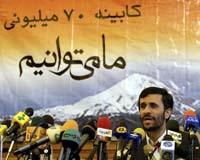| . |  |
. |
Washington (AFP) Jan 10, 2010 The United States has developed contingency plans to address Iran's nuclear ambitions if negotiations falter between the Islamic republic and Western nations, a top US general said Sunday. "It would be almost literally irresponsible if CENTCOM were not to have been thinking about the various 'what ifs' and to make plans for a whole variety of different contingencies," said General David Petraeus, who heads the US Central Command that oversees the Middle East, the Gulf region and Central Asia. Petraeus declined to comment on reports that Israel, which says Iran presents an existential threat to the Jewish state, may attack its arch-foe's nuclear facilities. But he told CNN the facilities "certainly can be bombed" even though they are reportedly heavily fortified. "The level of effect would vary with who it is that carries it out, what ordnance they have, and what capability they can bring to bear," he added. Without elaborating on the contingency plans, the general said it could be some time before Washington decides whether to execute them and that diplomatic efforts would continue in the meantime. Tehran is at loggerheads with Western nations, which charge it is developing nuclear weapons under the cover of a civilian nuclear energy program. Iran denies the charges. The United States is leading efforts to slap a fourth round of UN sanctions on Iran after it failed to meet an end-of-year deadline to accept a deal offered by five permanent UN Security Council members -- Britain, China, France, Russia and the United States -- plus Germany. Iran gave the West until the end of January to accept its own proposal and President Mahmoud Ahmadinejad said Saturday that Tehran will not back down "one iota" in the face of international pressure over its atomic work. The top US military officer meanwhile said Iran has a "strategic intent" to develop nuclear weapons but urged a new diplomatic push to stem Tehran's nuclear drive, warning that a strike on the Islamic republic would be "very destabilizing." "I think that would be an incredibly destabilizing outcome and potentially generate a nuclear weapons race in that part of the world," Admiral Michael Mullen, the chairman of the Joint Chiefs of Staff, told CNN. "I think an attack would also be, by us or by anybody else, be very destabilizing. US officials have repeatedly insisted they are keeping "all options on the table," which includes a military option, when it comes to Iran. When it comes to Iran's alleged intent to develop nuclear weapons, Mullen stressed it was "important that leaders throughout the world do everything we can to make sure that, one, they don't consummate it and, two, we don't get to a point where an attack is imminent." Leading US Senator Joe Lieberman, an independent who usually votes with the Democrats, said economic sanctions were not enough. "We have to do everything we can not just to put economic sanctions on Iran because of their development of nuclear weapons but to support the people of Iran, to cry out against the human rights abuses, the terrible repression of the demonstrators and just the freedom of average citizens in Iran." Mass protests broke out as a part of what has been dubbed the opposition "Green Movement" in June over hardline President Mahmoud Ahmadinejad's controversial re-election. Opposition demonstrators also clashed with security forces during the Shiite mourning ceremonies of Ashura in Tehran on December 27, leading to the deaths of at least eight people and hundreds of arrests, according to police. Republican Senator John McCain, who lost his White House bid to President Barack Obama in 2008, said the public disenchantment with Iran's hardline regime evidenced by the protests meant "this regime's days are numbered."
Share This Article With Planet Earth
Related Links Learn about nuclear weapons doctrine and defense at SpaceWar.com Learn about missile defense at SpaceWar.com All about missiles at SpaceWar.com Learn about the Superpowers of the 21st Century at SpaceWar.com
 Iran's Ahmadinejad dismisses nuclear sanctions
Iran's Ahmadinejad dismisses nuclear sanctionsTehran (AFP) Jan 9, 2010 Iran's President Mahmoud Ahmadinejad said on Saturday that further UN Security Council sanction will not deter Tehran from pursuing its controversial nuclear programme. The hardliner also vowed that Iran will not back down "one iota" in the face of international pressures over the atomic work, which the West fears may be a cover for weapons development despite Iran's persistent denial. ... read more |
|
| The content herein, unless otherwise known to be public domain, are Copyright 1995-2009 - SpaceDaily. AFP and UPI Wire Stories are copyright Agence France-Presse and United Press International. ESA Portal Reports are copyright European Space Agency. All NASA sourced material is public domain. Additional copyrights may apply in whole or part to other bona fide parties. Advertising does not imply endorsement,agreement or approval of any opinions, statements or information provided by SpaceDaily on any Web page published or hosted by SpaceDaily. Privacy Statement |